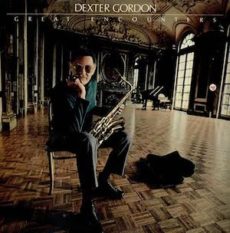
Requisites
Great Encounters ~ Dexter Gordon | By Eddie Carter
Dexter Gordon steps into the spotlight for this report with two sessions making up the album, Great Encounters (Columbia JC 35978). Side One consists of two tracks recorded live at Carnegie Hall on September 23, 1978. The three tracks on Side Two were recorded at CBS Recording Studios on May 1, 1978, and January 26, 1979. The personnel appearing with Dexter on this record are Woody Shaw on trumpet, Curtis Fuller on trombone, and Eddie Jefferson on vocals (tracks: B1, B3), Johnny Griffin on tenor sax (tracks: A1, B1), George Cables on piano, Rufus Reid on bass, and Eddie Gladden on drums. My copy used in this report is the 1979 US Stereo album.
Blues Up and Down was written in 1950 by Gene Ammons and Sonny Stitt. This tune is the epitome of the terms, “blowing session”, or “cutting session”, and was first heard on Battle of The Saxes. Both saxophonists begin the melody at a blistering speed. Dexter gives a lengthy performance rivaling the speed of Indy 500 race cars. Johnny responds with an amazing quickness on the next reading. Dex and Griff continue sparring with each other vigorously until the climax. Cake, a Gordon original, was written in 1962, premiering on his album Go, as Cheese Cake. The trio makes an efficient introduction, then both horns work together on the melody. Gordon goes first with a heated reading. Griffin delivers the second solo with the impact of a brick through a plate-glass window and Gladden has a brief conversation with both saxes into the close. Both songs also appear on the CD album, Live at Carnegie Hall (1998).
The mood changes to start Side Two with a rollicking rendition of Gordon and Jefferson’s original Diggin’ In. The front line gets the party started with a lively introduction, then Jefferson stokes the engines with an impressive vocal melody and an exchange with Dexter on the lead solo. The saxophonist takes over for a jubilant reading that swings like mad. Woody comes in next to fuel the rhythm section with fire from his horn. Curtis gets the last word with an enthusiastic presentation. Ruby My Dear was written by Thelonious Monk in 1947 and appeared on Genius of Modern Music (1952). Lyrics were added by Sally Swisher for Carmen McRae who sang it on her tribute album, Carmen Sings Monk (1990). Gordon’s opening statement is picturesque, lovely, and elegantly presented. Cables expresses a haunting dreaminess on the second reading ahead of a gentle climax.
It’s Only a Paper Moon was written in 1933 by Harold Arlen, E.Y. Harburg, and Billy Rose. The song starts on a joyous introduction by the trio segueing into the lively opening chorus by Dexter. Eddie creates pure pleasure in a vigorous vocal interpretation. Dex is inspired on the following statement, then Woody has a brief uptempo improvisation that’s especially gratifying. George communicates his excitement next on a short statement and Curtis hits a perfect stride with a concise comment before the ending. The choice of using Jefferson for this album happened when Dexter met up with him at The Tin Palace after performing at The Village Vanguard. My only regret is that he couldn’t be used for the entire album instead of just two tracks. Eddie was an innovator of Vocalese, his treatments of classic songs and ballads were fresh and exciting, possessing a tremendous fire and imagination.
Six months after this recording session, Eddie Jefferson was shot and killed after leaving Baker’s Keyboard Lounge in Detroit, Michigan on May 8, 1979, by a disgruntled dancer he fired. The engineers behind the dials on Great Encounters are Tom Arrison (tracks: A1, A2), Don Puluse (track: B1), and Jerry Smith (tracks: B2, B3). The live and studio tracks are wonderfully recorded with a stunning soundstage that places the listener in the concert venue and the studio. If you’re a fan of Dexter Gordon, Great Encounters is an underrated album of wonderful performances that I recommend for your library, and it might just become one of your favorites!
~ Vocalese – a musical composition consisting of the singing of melody with vowel sounds or nonsense syllables rather than text, as for special effect in classical compositions, in polyphonic jazz singing by special groups, or in virtuoso vocal exercises. Source: Dictionary.com
~ Battle of The Saxes (Prestige PRLP 107), Carmen Sings Monk (Novus 3086-1-N), Extensions (Atlantic SD 19258), Genius of Modern Music (Blue Note BLP 5002), Go (Blue Note BLP 4112/BST 84112), Live at Carnegie Hall (Columbia Legacy CK 65312) – Source: Discogs.com ~ Eddie Jefferson, It’s Only a Paper Moon, Ruby My Dear – Source: Wikipedia.org ~ © 2021 by Edward Thomas Carter
More Posts: choice,classic,collectible,collector,history,instrumental,jazz,music,saxophone


